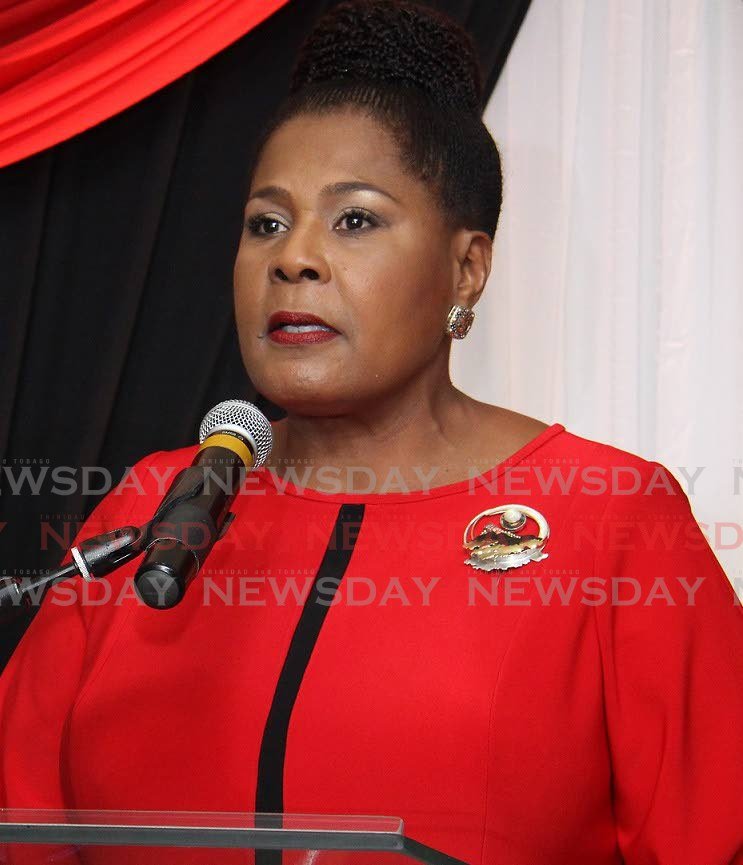Ria Chaitram
5 Hrs Ago

Paula-Mae Weekes. –
President Paula-Mae Weekes has defended her silence amidst the uproar of racist rants by members of the public during the recent general election campaign.
In her Independence Day message, she said as many looked on for her intervention to bring calm to the hurt in a type of “kumbaya” effect, intervention at the time would have provoked further anger in an already enraged population.
“As Head of State, I am careful in deciding both content and timing of my statements in order to avoid provoking more heat than light. Appeals to the nation are not likely to find fertile ground when passions are inflamed, intellect and reason decamp, and parties remain mired in their entrenched positions.
“Additionally, a President’s words are seen to carry great weight and are subject to close examination and individual interpretation.
“Given the climate, I thought it best to await the final result of the election and make all relevant appointments before issuing a statement. This had the serendipitous effect of allowing for a cooling-off period.”
She noted that race issues have always dwelled among the population and the messages coming from the general election campaign flipped the country over and exposed its ugly underbelly.
Weekes said she was disgusted and dismayed by the appalling interactions between supporters of the two major parties, which was largely done via social media through the anonymity offered by the keyboard.
“Because we supported one party, we cursed, insulted and demonised supporters of other parties, often people we never met, tarring them with the same all-purpose brush; notwithstanding that we all know, and have interacted with, individuals who do not conform to our offensive racist stereotypes.
“While some of these exchanges may have taken place at close quarters, social media provided a convenient and safe vehicle from which to launch attacks.”
She noted that while things may have settled, the underlying issues and feelings did not magically disappear.
During the ordeal, Weekes said, there were some people and organisations who fought for peace and togetherness, which gave hope that there were people willing to speak up in support of and defend the country when circumstances warranted. S
he called for urgent intervention to deal with the issues which, she predicated, will resurface if the root cause is not addressed.
Weekes said the initiative undertaken by the University of the West Indies and the Catholic Commission for Social Justice on race relations was a step in the right direction. “Our only hope of treating with this scourge once and for all is to attack it at the root, recognising that it is the result of our histories, our origin, our arrival, our incorporation into the society and our politics.
“A practical and sustainable programme under the umbrella of a national framework must be developed with all urgency.
“Our penchant for procrastinating, vacillating and eventually shelving the ubiquitous report cannot be countenanced.”
She acknowledged that the process will be long, time consuming and costly but noted that accurate, historical information must be made available to the public through digestible modules which can be disseminated through schools, workplaces, places of worship and other fora where citizens congregate. “Understanding and reversing the effects of accumulated prejudices, misconceptions and disenfranchisement will take many years, perhaps spanning several decades before we achieve the desired outcome.
“In whatever our sphere of influence, we must find ways to make a positive difference. Call out racism, investigate the source and accuracy of information before disseminating, share your views responsibly, comment civilly and do not allow disagreement to descend into personal abuse, needless invective and malicious labelling.”
One of her recommendations in moving forward is the use of non-denominational invocations.
“It is important that we also heighten our awareness of the myriad ways in which we unintentionally exclude “others” as we go about our routines, tone deaf to the social alienation that we cause.
“A prime example is when we insist on using Christian prayers at secular events and assemblies, where there are invariably people of other faiths.
“I do not think that having individual prayers said by representatives of multiple religions is the solution.
“I recommend that, where appropriate, non-denominational invocations acceptable to all religions are used. We must always opt for inclusivity and be alert to the possibility of giving inadvertent offence in our day-to-day affairs.”
She noted that the covid19 pandemic continues to present challenges but urged for alternative methods to address race relations decisively.
“Without blaming and shaming, let us at every level, personal, institutional, political, governmental, social; commit to consciously, resolutely and patriotically ridding our society of this divisive affliction.”
Source link
